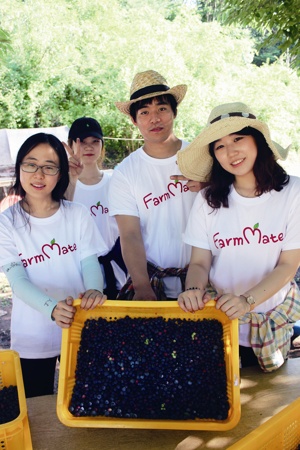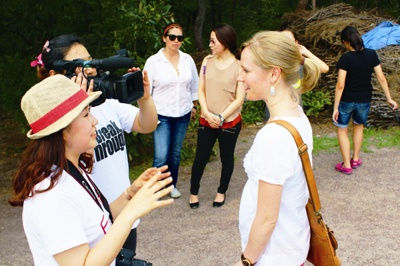
Food experts worldwide consider Korea’s farmland culture to be an unpolished diamond. They say that with four distinct seasons and a variety of agricultural land, Korean farms hold immense potential, yet are little known to the public.
A group of students is trying to change this reality, however, by learning about farmland culture and working with social networking services to present what they have learned to those living in cities and unaware of Korea’s farmland resources.
A program designed for university students between ages 20 and 32, “Farmmate” provides students with accurate knowledge and hands-on experience of farms, farm products, and healthy diets. The idea to expose students to the origin of natural food and the process undergone by the dishes that end up before them first came from recognizing the vast distance between farms and students today.
“After giving a special lecture at Ewha, I realized that so many students today who major in food service management or other such popular culinary studies, are not really familiar with the status quo of farms or how the products are processed,” said Michele An, the chief executive of the Big Farm Company and the mentor of Farmmates.
An’s realization led her to contribute her knowledge and her company’s resources to educate students, based on her belief that today’s youth, as future leaders, should know more about healthy diets and foods. They began “Farmmates” in the fall of 2011, with just four university student members. Now in the process of recruiting the fifth group to the program, the 50 former Farmmates continue to work with and to guide each generation of incoming members.
“One cannot discuss food without knowing about farms but, ironically, most of this is unknown to students, which leads to unhealthy preparation of meals and eventually harms people’s health,” An said.
By educating and revealing the abundant farmland resources in Korea, the Big Farm Company seeks to bring the farmland culture closer to those living in cities. It is the first and only one of its kind in Korea. Similarly, the Farmmate program promotes a healthy food culture through participants.
Student Farmmates are required to take an eight-week-long program that covers multiple aspects regarding food, from the very basics of farming, to the required standards for food stamp programs.
During the last three weeks of the program, Farmmates divided into groups and disperse, to put into practice their own ideas to bring the farmland culture and traditional markets closer to the metropolitan culture.

An said that no matter how brilliant the Farmmates’ ideas may be, it is nearly impossible for shop owners to immediately adopt them, as many of the owners have been in business for a long time and are accustomed to their ways of doing such things. She said that is why it is up to the Farmmates to come up with realistic and effective plans that can be carried out in reality.
“For national Farmer’s Day at Gimpo last November, we made a video clip to promote the day to the public,” said Park Da-young (Nutritional Science & Food Management, 2), one of the initial four Farmmates. “We also devised plans to make displays at traditional markets more eye-catching to shoppers, and help shop owners clean and rearrange their stores to appeal more.”
Park said not all shop owners welcomed helping hands, doubting whether mere university students would really be serious about the business and also about their capabilities. However, they were moved by the extent to which Farmmates researched, planned, and organized their ideas and began to welcome them.
Guiding the Farmmates during the past year has taken all weekends, but An says she is proud of the changes in the Farmmates.
“They tell me how their eating habits started to change and that they encourage family and friends to be more aware of what they eat,” An said.
Heading into their second year, An and the Farmmates’ next goal is to pass on the same learning opportunity to foreign exchange students who are studying in Korea.
“I want to introduce Korean cuisine to foreign exchange students and show them how ‘Floss’—fresh, local, organic, sustainable, and seasonal—Korean agricultural products are,” An said.
The official Farmmate recruiting announcements for foreign exchange students will appear on the Big Farm Company homepage (http://www.big-farm.com/) in November.

